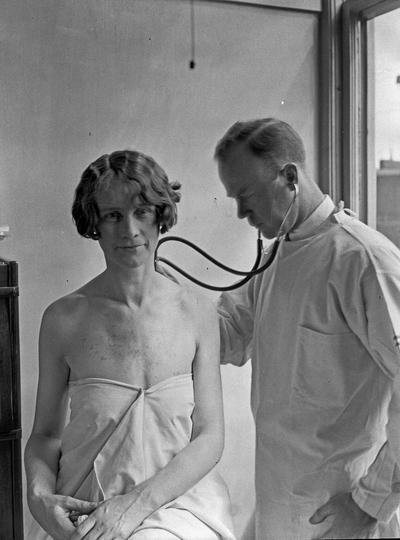Advertisement
Study: Despite Risk, OB's Urge Ovary Removal With Hysterectomy
A new study by Massachusetts doctors underscores a common phenomenon in medicine: patients often get treatment advice that contradicts what may actually be best for them.
In this case, researchers found that "many OB/GYNs continue to advise pre-menopausal women to have their ovaries electively removed along with hysterectomies, despite indications that the benefits of retaining the ovaries may exceed risks of doing so, including ovarian cancer."
 The study, co-authored by Drs. Oz Harmanli of Baystate Medical Center and Tufts University School of Medicine with Julia Shinnick, Keisha Jones, and Peter St. Marie, is summed up in the news release:
The study, co-authored by Drs. Oz Harmanli of Baystate Medical Center and Tufts University School of Medicine with Julia Shinnick, Keisha Jones, and Peter St. Marie, is summed up in the news release:...one-third of OB/GYNs surveyed continue to recommend elective removal of the ovaries for hysterectomy candidates younger than 51 years old, and the majority recommend the procedure for hysterectomy candidates 51 to 65 years old. The procedure is seen as an effective way to head off ovarian cancer; however, the benefits of retaining the ovaries, mainly in the form of continued estrogen production and its effects on the body, may supersede any risks. The American Congress of Obstetricians and Gynecologists (ACOG) has made recommendations opposing elective ovary removal before menopause.
“We believe many women are electively having their ovaries removed based on recommendations from their doctors that may not be consistent with best practice,” said Dr. Harmanli, chief of Urogynecology and Pelvic Surgery at Baystate Medical Center. “Retaining the ovaries before menopause can confer cardiovascular, sexual and other benefits. Hormone therapy is not risk free and can’t always replace what’s lost with oophorectomy (ovary removal), and in this survey we see solid proof that the best advice is not always being given.”
Some researchers advise conservation of ovaries at the time of hysterectomy, based on some evidence that ovaries continue to help decrease mortality up to age 65. Another finding of this survey was that over 90% of OB/GYNs do not follow this advice.
Demographic characteristics of the respondents did not appear to play any role in their opinions, neither did a physician’s age, sex, location or years in practice.The study also found that a woman’s personal history of breast cancer or a family history of ovarian cancer does affect a physician’s decisions to perform elective oophorectomy. Other factors, such as a woman’s history of osteoporosis, cardiovascular disease, sexual dysfunction, and previous contraceptive use, affect their decisions less—despite some recommendations to consider these factors.
An anonymous, self-administered survey was mailed to 1,002 randomly selected practicing obstetrician-gynecologists in the United States in April 2012.
Dr. Mache Seibel, a professor at the University of Massachusetts Medical School specializing in menopause and mental health, sent me this comment on the study via email:
This article shows the continued dilemma in getting the most recent information to both women and their doctors. While I agree that a woman with any family history of ovarian cancer or who possesses certain genetic predispositions to ovarian cancer such as the BRCA gene should strongly consider having her ovaries removed whether or not she has a hysterectomy, the dictum of decades ago that "a garden that doesn't grow flowers grows weeds" seems totally anachronistic. This is particularly try for women between the ages of 50 and 59 as demonstrated in the July 18, 2013 issue of the American Journal of Public Health which showed that over a 10 year span, starting in 2002, between 18,601 and 91,610 postmenopausal women died prematurely because of the avoidance of estrogen therapy...
For those women who do decide to have their ovaries removed, I strongly urge them to consider estrogen therapy to lower their risk of heart disease, osteoporosis and even breast cancer.
This program aired on August 15, 2013. The audio for this program is not available.
